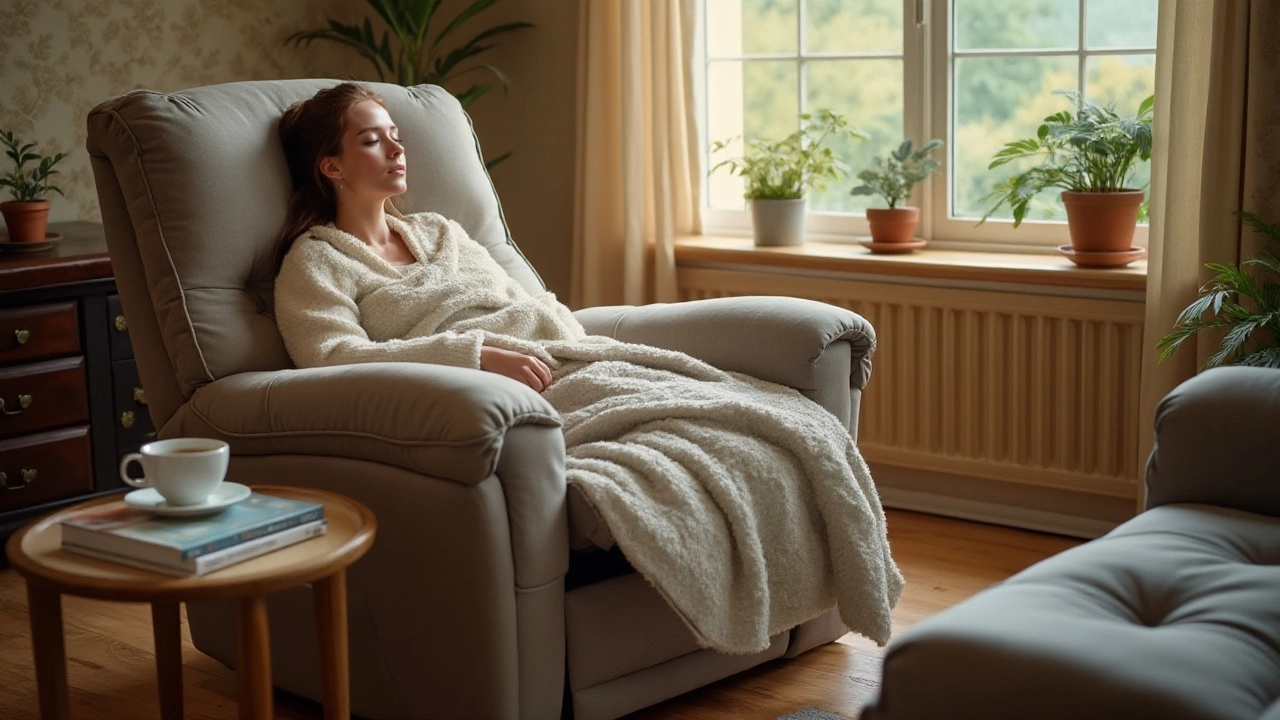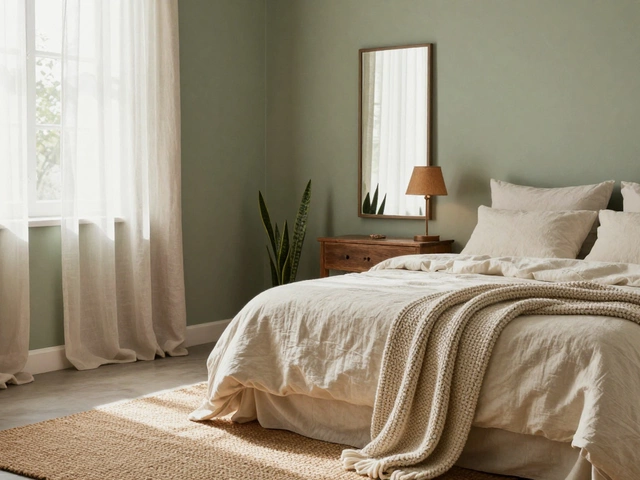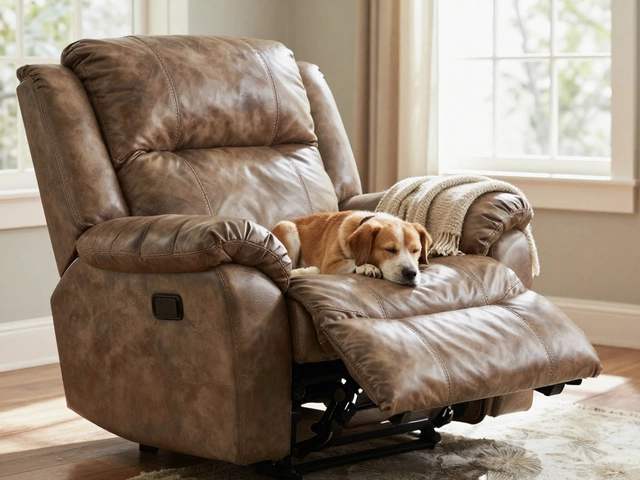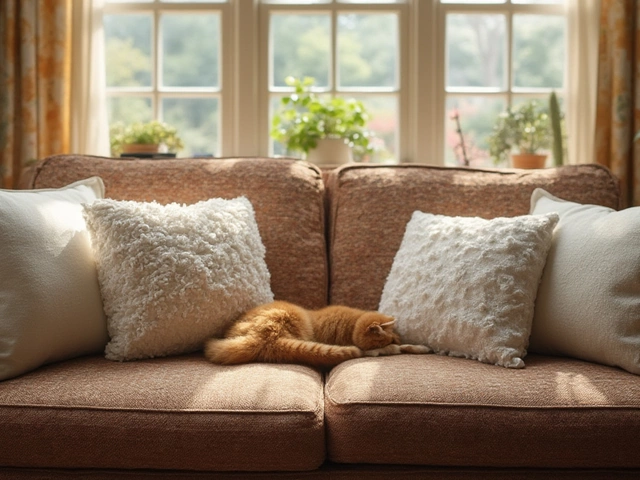Have you ever wondered if you could swap your bed for a recliner every night? It might sound like an eccentric choice for some, yet it holds surprising benefits for others. Recliners aren't just for bouts of relaxation during the day; they can become your go-to sleep haven, offering unique advantages.
Many people find comfort in recliners due to their ability to support the body in specific ways that a bed may not provide, especially for those dealing with certain health conditions. However, when considering this switch, it's important to weigh the pros and cons to ensure it aligns with your overall well-being and lifestyle.
In this article, we'll delve into how recliners can serve as a nightly refuge, discuss the potential health impacts, and guide you in choosing the perfect recliner to enhance your sleep experience. So, if you're contemplating this lifestyle change, keep reading to discover everything you need to know about sleeping in a recliner every night.
- Benefits of Sleeping in a Recliner
- Health Considerations and Risks
- Choosing the Right Recliner for Sleep
- Tips for Better Sleep in a Reclining Position
Benefits of Sleeping in a Recliner
Sliding into a recliner at the end of a long day can feel like a hug for the body. Beyond the immediate comfort, there are several intriguing benefits if you decide to make it your permanent nighttime nest. Recliners are designed to support your body in a semi-upright position, which can notably improve your breathing, especially for those who suffer from conditions like sleep apnea or nasal congestion. A reclined position helps keep airways open, reducing the occurrences of snoring significantly. Many have found that the elevation of the legs can also aid in blood circulation, particularly for individuals dealing with lower limb edema or varicose veins.
"For people recovering from surgery or with chronic back pain, sleeping in a recliner can alleviate pressure on the spine and joints," says renowned sleep specialist Dr. Samantha Greene. "The adjustable nature allows for fine-tuning the support, offering relief that is often missing from traditional beds."
One of the more unexpected benefits of settling down in a recliner chair is its potential to improve sleep quality. When the spine is properly aligned, and weight is evenly distributed, it minimizes tossing and turning—a common disruption during sleep in traditional settings. Furthermore, the gentle incline helps prevent acid reflux, a common reason many struggle to maintain deep, uninterrupted sleep. By elevating the torso, the likelihood of stomach acids creeping up the esophagus diminishes. According to studies, nearly 20% of the population experiences symptoms of GERD, and positional adjustments during sleep can significantly help manage this condition.
It's also important to mention the psychological comfort many users report. The cocoon-like embrace of a recliner mimics the soothing feeling of being held and can help reduce stress levels, promoting a deeper sense of restfulness. This can be particularly beneficial for those who find themselves dealing with insomnia or anxiety-related sleep issues. Recliners create a personalized sleep space that can be conducive to relaxation, offering each individual control over their sleep environment. Additionally, the use of a recliner is not limited to nighttime; it can serve as a serene nook for mid-day naps or to catch up on reading.
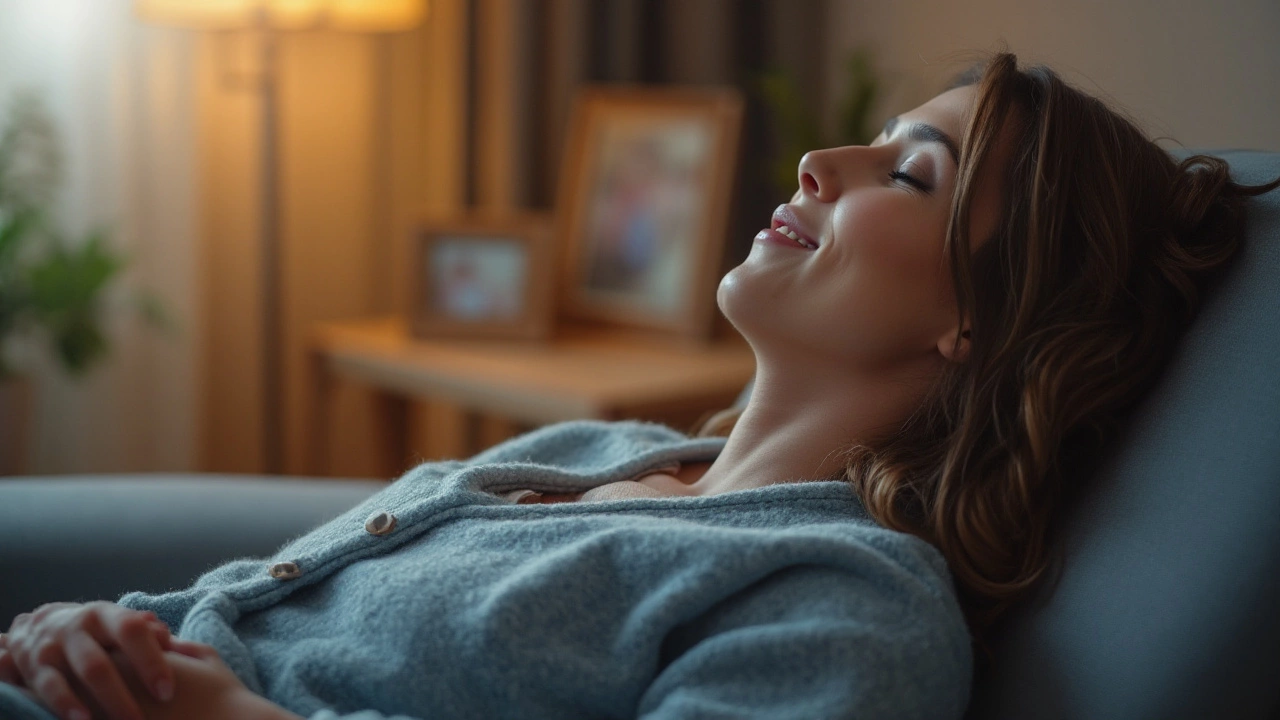
Health Considerations and Risks
When considering making a recliner chair your permanent nightly sleeping spot, it's essential to weigh both the health benefits and potential drawbacks. This lifestyle adjustment can be a real boon for some, but it's critical to do so with awareness and a clear understanding of what it means for your body and long-term well-being.
One of the primary health considerations is spinal alignment. Recliners are designed to be highly adjustable, which can be advantageous if you tailor them correctly to support your back. However, improper angles or support may lead to discomfort or strain over time. Unlike mattresses, which have evolved alongside our understanding of sleep ergonomics, recliners may not provide the even distribution of pressure that your body needs during extended periods of rest. It's crucial to tweak your recliner's settings so your spine maintains a natural curve, thereby reducing the risk of back pain.
Additionally, sleeping in a reclining position can benefit those with respiratory disorders. Elevating the head can ease breathing more effectively than lying flat on a typical bed. For people with conditions like sleep apnea or chronic obstructive pulmonary disorder (COPD), a recliner might actually enhance sleep quality by mitigating airway collapse. Some have found significant relief from symptoms when switching to recliner-based sleep. However, not all medical professionals agree, emphasizing the need for individual assessment.
"The idea of sleeping in upright positions is not new, especially in cases where gravity can assist in reducing pressure on the airways," notes Dr. Steven B. Slotkin, a well-known sleep specialist.
On the risk side, prolonged use of recliners for sleep may pose some circulation issues. Extended periods in the same position might lead to reduced blood flow to the extremities. Ensuring that the recliner doesn’t pinch any parts of the body and taking time to move regularly can help mitigate these concerns. People with predispositions to deep vein thrombosis should consult their healthcare provider before making this shift permanent.
Moreover, there's an interesting psychological aspect to consider. Our brains are set in the habit of associating the bed with sleep. Shifting that paradigm might disrupt natural sleep cycles at first. It can take some time for the body to adapt to a new prior sleeping routine. For those who travel often and encounter recliners in hotel rooms and airport lounges, this adaptation might even prove beneficial.
For those contemplating this transition, the broader impact of sleep quality on health—mental and physical—can't be understated. Poor sleep can lead to various complications, from mood disturbances to systemic issues. It's essential to monitor how your body responds and make adjustments as necessary to optimize sleep health. And, of course, consult with healthcare professionals when in doubt, especially if you have underlying health concerns.
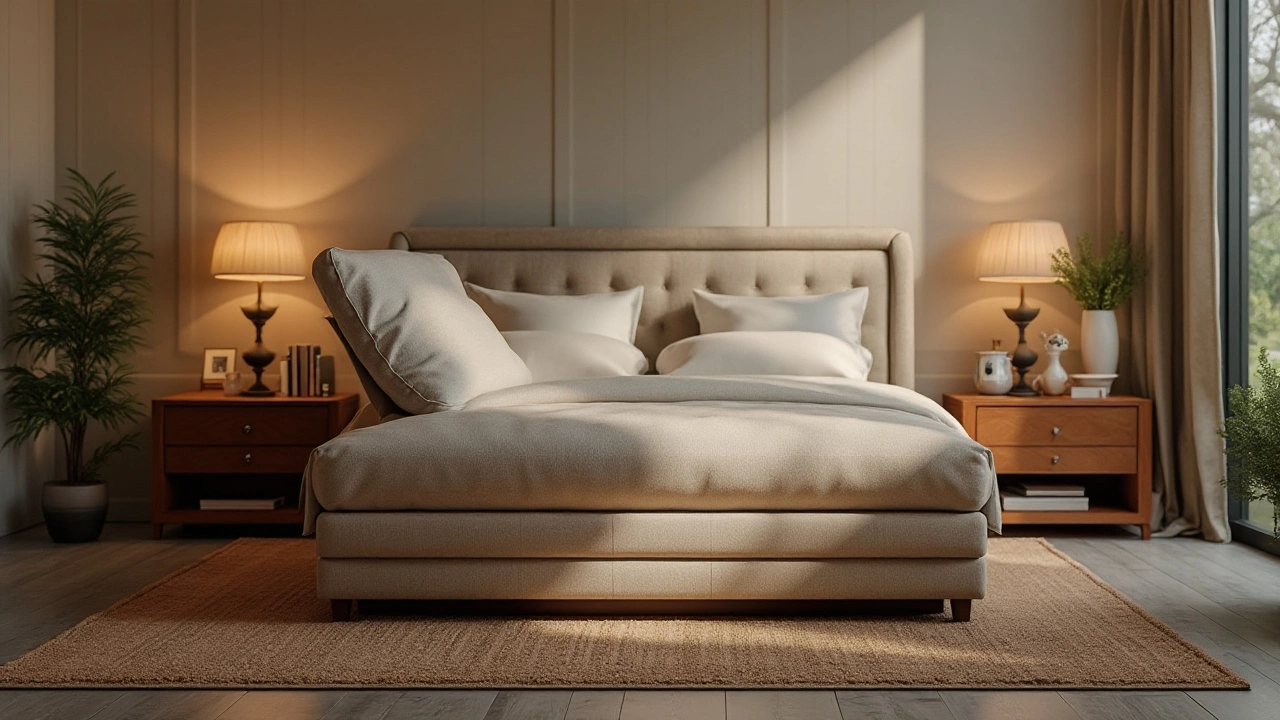
Choosing the Right Recliner for Sleep
Picking the right recliner for nightly use requires careful consideration of several factors that go beyond aesthetics. First and foremost, consider the space where the recliner will reside. You want to ensure it fits comfortably in your room, allowing for enough room to fully recline without obstruction. The recliner's material should also be considered; for instance, easy-to-clean fabrics might be beneficial if you intend to spend a lot of time in it. Leather or high-quality microfiber could be practical choices, offering a balance between comfort and durability.
One important aspect is the level of support a recliner offers. Orthopedic specialists emphasize the importance of spinal support for maintaining good posture and preventing back issues. Look for a recliner that provides adequate lumbar support and has adjustable features that cater to your specific sleeping needs. Many modern recliners come with customizable settings. For instance, some offer heat and massage functions, which could enhance relaxation and improve circulation, which is crucial if you're considering regular nights in a recliner.
Size is another critical factor in your selection. A recliner should suit your body size and shape to ensure comfort throughout the night. It should be wide enough for easy movement but snug enough to provide essential support. The recliner's weight capacity should also be considered, especially if it's going to be used by multiple people. Recliners come in various sizes from standard to oversized models, and each serves different needs, so choosing one that fits your physique can significantly enhance comfort.
Positioning versatility can make a significant difference for those with specific health concerns. Some recliners permit multiple reclining positions, which might be beneficial for various issues like acid reflux or sleep apnea. According to a study published in the Journal of Clinical Sleep Medicine, elevation of the upper body can reduce sleep disturbances caused by these conditions. A recliner with a lot of adjustability can make it easier to find the perfect angle to improve your sleep quality.
"Investing in a recliner with the right features for night-time use can vastly improve one's quality of sleep, according to Dr. Jennifer Miller, a sleep specialist at the Sleep Institute."
Also, consider the mechanism of the recliner. Electric recliners often allow smoother adjustments with minimal effort, whereas manual recliners might require a bit of a nudge to get into the desired position. While they might be pricier, electric recliners offer ease of use, especially crucial if mobility is an issue. Many users find the investment worthwhile when it comes to long-term nightly use.
Finally, test the recliner before making a purchase. Spend some time sitting and lying back in it to get a real feel for comfort levels. This hands-on approach is much more reliable than relying solely on online reviews or consumer reports, which while useful, might not necessarily align with your personal comfort requirements. Your unique necessity for comfort should always be prioritized over others' opinions. Thus, finding the perfect recliner is a balance of practicality, comfort, and personal preference.
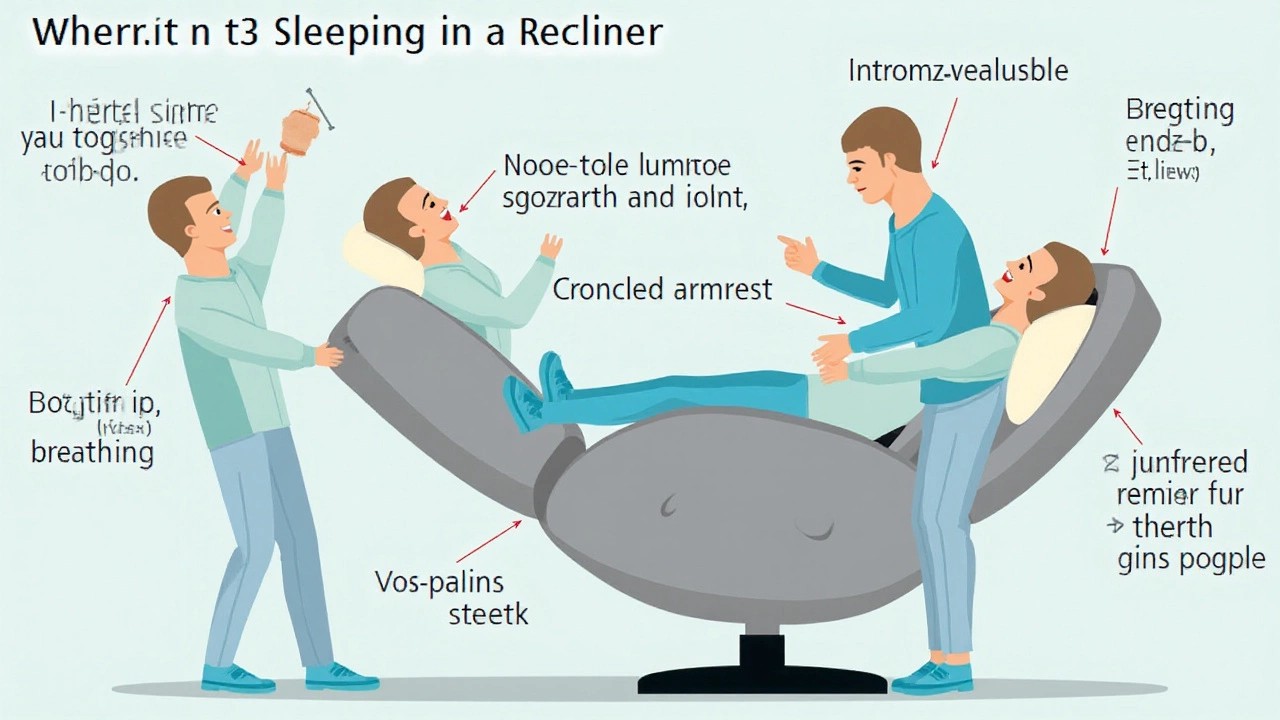
Tips for Better Sleep in a Reclining Position
Embracing the idea of sleeping in a recliner each night calls for a deep dive into optimizing this distinct sleep environment. To start with, positioning is critical. One of the most important aspects of reclining sleep is ensuring the angle of recline is suited to your demands. Experts suggest an angle that supports your back's natural curve while keeping stress off your lumbar region. For many, a 45-degree angle presents a balance where breathing becomes easier, relieving pressure from the spine, and promoting thorough relaxation.
Your posture can have a profound impact on your sleep quality and health, especially when using recliner chairs. Keep your feet elevated just above heart level to help reduce swelling and improve circulation. This position can be quite beneficial for people with conditions like sleep apnea, congestive heart failure, or GERD. A recliner designed with customizable headrests and footrests could cater better to such needs, supporting better alignment and comfort across different body types.
Ensuring the recliner is comfortable yet supportive is another key consideration. Unlike traditional mattresses which can be adjusted with toppers or pads, a recliner's cushioning determines much of the comfort and support it offers. Focus on recliners that feature high-quality memory foam, which molds perfectly to your body's shape, providing crucial support while preventing imprints after prolonged use. The material of the chair covers is another component that shouldn’t be overlooked; breathable fabrics can help manage body temperature throughout the night.
Adjustability is a significant feature that can enhance the sleep experience. Recliners with programmable positions provide varying degrees of elevation and tilt to meet individual needs. The convenience of adjusting the position remotely without disrupting your rest can lead to uninterrupted, peaceful sleep sessions. Additionally, recliners with integrated heaters or massagers can offer relaxing warmth or gentle vibrations, promoting relaxation that leads naturally into sleep.
Consider your ambient environment as well: the lighting, temperature, and noise level around you can significantly influence your sleep. Utilize blackout curtains or eye masks to minimize light, and sound machines or earplugs to drown out any noise. Keep your space cool, as lower temperatures are conducive to sleep. By pairing these environmental adjustments with the comfort of a recliner, you're setting the stage for restful, rejuvenating slumber.
"A recliner is not merely a chair, but in some cases a health tool," notes Sleep Specialist Dr. Armand Nash. "For those struggling with issues like sleep apnea, GERD, or chronic back pain, a recliner can alleviate symptoms simply through correct positioning."
Finally, remember to establish a consistent bedtime routine. Just because you're embracing a new sleep setup doesn't mean the rules of good sleep hygiene should be cast aside. Adopting calming pre-sleep activities like reading or meditating and avoiding screens close to bedtime can significantly enhance the quality of your sleep in a recliner. By honoring these old-but-gold sleep wisdoms, paired with the perks of a recliner, you give yourself the best possible chance of achieving deep, restful sleep.
